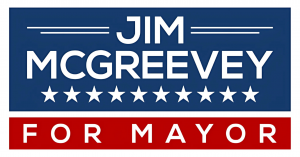Overspending: A Way of Life in Jersey City
Jersey City’s finances spiral with $73M overspent, $94M deficits, and $112M in deferred charges—taxpayers foot the bill for years of mismanagement.
JERSEY CITY, NJ, UNITED STATES, April 10, 2025 /EINPresswire.com/ -- According to a review of the 2021-2023 audited financial statements, the 2024 municipal budget, and other City documents, Jersey City's finances are in serious disarray. Over the past three years, the municipal/property tax rate has risen by 51.4%, reflecting a lack of control over spending.Over the next three weeks, I will elaborate on (1) Jersey City’s fiscal mismanagement, (2) the unacceptable results of national credit-rating agencies’ Jersey City audits, and (3) my plan for restoring control over Jersey City’s budget to stabilize property taxes.
Independent audits reveal that the City overspent more than $73 million over the amounts authorized in the adopted annual budgets. This overspending stems from poor internal financial controls, which allowed purchases to be approved without confirming available funds. As a result, the City is stuck with bills years after services are rendered.
- Once a product is received or a service rendered, legally due payments cannot be declined or renegotiated.
- City residents and the government cannot opt out of paying their bills.
- If the City cannot pay bills immediately, taxpayers must do so in later years.
The City also faced financial deficits in 2021 and 2023, totaling $94 million—a rare occurrence for local governments in New Jersey. Such deficits are typically reserved for the federal government, not local municipalities, and Jersey City will be paying off this fiscal mismanagement for years to come.
Audited statements reveal $219 million in Deferred Charges incurred since 2018, with $112 million still on the books as of December 2023.
- Deferred Charges are amounts paid in one year but raised from taxpayers in future years, meaning Jersey City taxpayers will continue to bear the cost of past mistakes for years to come.
- Although the Federal government may incur a deficit, state law prohibits local governments from doing so, making Jersey City an outlier.
Adding to the poor situation, the $112 million that must still be paid does not account for potential unfulfilled payments in 2024, which we hope will be released shortly.
It is time for Jersey City to restore fiscal integrity by budgeting responsibly and addressing financial needs as they arise rather than continuing to push problems into the future. The City must recognize its budgetary responsibilities and act now to avoid further financial strain.
Jim McGreevey
Jim McGreevey For Mayor
+1 201-401-9966
email us here
Visit us on social media:
Facebook
X
Instagram
Legal Disclaimer:
EIN Presswire provides this news content "as is" without warranty of any kind. We do not accept any responsibility or liability for the accuracy, content, images, videos, licenses, completeness, legality, or reliability of the information contained in this article. If you have any complaints or copyright issues related to this article, kindly contact the author above.
Local Real Estate Firm Gives Back to Support Local Teachers
The Umansky Law Firm Announces Dismissed Charges in Mistaken Identity Case in Polk County
Chemical Catalyst Market is Expected to Grow USD 69.5 Billion by 2035, Driven by Efficiency, Sustainability & Compliance
Więcej ważnych informacji
 Jedynka Newserii
Jedynka Newserii

 Jedynka Newserii
Jedynka Newserii

Handel

Mercosur to tylko wierzchołek góry lodowej. UE ma ponad 40 umów handlowych, które mogą destabilizować rynek rolny
Umowa handlowa między UE a krajami Mercosur może znacząco zaburzyć konkurencję na rynku rolnym i osłabić pozycję unijnych, w tym polskich, producentów – ostrzegają rolnicy i producenci żywności. Umowie sprzeciwia się część krajów unijnych, które domagają się klauzuli ochronnych oraz limitów importowych. – Problemem jest jednak nie tylko ta konkretna umowa. Chodzi o cały system wolnego handlu, który się kumuluje z dziesiątek innych porozumień – podkreśla Andrzej Gantner, wiceprezes Polskiej Federacji Producentów Żywności.
Firma
Dzięki zdalnej weryfikacji tożsamości z wykorzystaniem AI firmy zminimalizowały liczbę oszustw. Rozwiązania wykorzystuje głównie sektor finansowy

Z najnowszych danych Eurostatu wynika, że w 2024 roku 5,9 proc. polskich firm korzystało z rozwiązań z zakresu sztucznej inteligencji. W 2023 roku był to odsetek na poziomie 3,67 proc. Wciąż jednak jest to wynik poniżej średniej unijnej, która wyniosła 13,48 proc. Jednym z obszarów, który cieszy się coraz większym zainteresowaniem wśród przedsiębiorców, jest weryfikacja tożsamości przez AI, zwłaszcza w takich branżach jak bankowość, ubezpieczenia czy turystyka. Jej zastosowanie ma na celu głównie przeciwdziałać oszustwom i spełniać wymogi regulacyjne.
Prawo
Daniel Obajtek: Własne wydobycie i operacyjne magazyny to filary bezpieczeństwa. Zgoda na magazyny gazu poza krajem to rezygnacja z suwerenności energetycznej

Były prezes Orlenu ostrzega przed zmianami w ustawie o zapasach ropy naftowej, produktów naftowych i gazu ziemnego. Jego zdaniem przygotowana przez rząd nowelizacja tzw. ustawy magazynowej i ujednolicanie unijnej polityki energetycznej to zagrożenie dla bezpieczeństwa energetycznego Polski. W jego opinii tylko silna spółka narodowa, własne wydobycie, krajowe magazyny i zbilansowany miks energetyczny zapewnią Polsce bezpieczeństwo i konkurencyjność.
Partner serwisu
Szkolenia

Akademia Newserii
Akademia Newserii to projekt, w ramach którego najlepsi polscy dziennikarze biznesowi, giełdowi oraz lifestylowi, a także szkoleniowcy z wieloletnim doświadczeniem dzielą się swoją wiedzą nt. pracy z mediami.






![Nestlé w Polsce podsumowuje wpływ na krajową gospodarkę. Firma wygenerowała 0,6 proc. polskiego PKB [DEPESZA]](https://www.newseria.pl/files/1097841585/fabryka-nesquik_1,w_85,r_png,_small.png)



.gif)

 |
| |
| |
|